|
|
 |
 |



- We asked the directors three questions.
|

|
Do you think that digital technologies will someday completely (100%) take the place of film?
|

|
Do you think that short film will establish itself as an entertainment genre?
|

|
Which Japanese directors do you like?
|



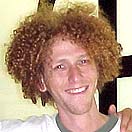

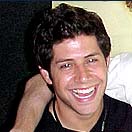
|

|

Maybe movies shot digitally will eventually replace movies shot on film. But then think about it this way. If more filmmakers make their movies using the digital techniques, then the annual income made by the film production companies would decrease. Then in order to sell, the companies would begin to lower their film prices. Then as a result people would be able to make films with a cheaper price. Then that'll mean that filmmaking would become more open to a larger population, so as a result the number of movies made by using film would once again increase.(Drew)

Of course. People are always looking for variety in life so the short film market will probably continue to grow. Maybe some time soon there'll be a channel, which will show only Short Films, kind of like the MTV. Believe it or not there are enough short films out there to fill half a year of programming non-stop without repeating any of the films. (Drew)
Whether or not the actual market for Short Films expands, I think Short Film production will continue to grow. I mean, short films really allow a filmmaker to create the world of his imagination. (Brian)

I think Akira Kurosawa's films such as "The Seven Samurai" and "Rashoumon" have had a great impact on Americans. I've seen so many films with plots based on "Rashoumon". (Brian)
John Woo isn't Japanese. Ha ! Well I guess I am also like the "Seven Samurai" (Drew)

|
Even as he masters his career as a filmmaker, Brian is also mastering his career as an actor. In his recent film "The Great Upsidedown" he starred, upside down. He began his career as an actor at the age of 19 and ever since then he has appeared in many movies, TV series, and TV commercials. "The Great Upsidedown" is the first film that he has directed.
"It was so hot when we made the film that I was exhausted. The 2 guys who went upside down with me were pretty much ok but I had to direct as well so it was tough. Hanging upsidedown could have been really dangerous so I always had my fingers crossed and hoped that everything would go well and safe. I think because I was upside down myself I was able to ask the other 2 actors to do the same. If I didn't do it myself I would of not have been able to ask them. Before shooting this film I went to see my doctor to ask about how long a human being can actually stay upside down. Then the doctor told me that it depends on how accustomed the person is to the unusual situation. After hearing this I practiced for 2 weeks straight!"
The producer of this film, Drew Bell, explained how he entered the film business.
"I moved to Los Angeles when I was 19 years old to become an actor. But as I began to write scripts I began wanting to create the world I wrote actually into a visual form. First I was writing short stories for myself and later on I joined my friend Brian and we began to make short films together."
Drew explained how he plans to get his short films seen throughout the world. "In the United States there are 400-500 festivals which show shot films, so first of all I am trying to apply for as many of those festivals as I can. If our films get accepted at large film festivals in places such as New York and Los Angeles then we'll get a lot of attention and recognition. But there are so many film festivals held in small towns and cities as well. A lot of the time, we don't get into a festival, but if we get into one then more people would watch our film so we'll try to apply to many festivals as possible."

 |


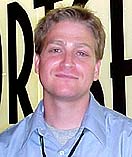

|

|

I think that digital and film technologies will develop in their own separate ways. I don't think it's a matter of one taking the place of the other. For me, personally speaking, I'll also continue to use digital technologies. The Matrix, for example, is for me a very good model, in which a very skillful use of digital technologies is woven into the story. If I could fuse them together in such an unobvious way, it would be great.

In the U.S. there are many film festivals that have been going on for two or three years like this one-I guess it's becoming a boom. With short films, as opposed to feature length films, you don't actually know what will happen, and there are many experimental works. I think its appealing because the audience is looking for stimulation.

Kurosawa Akira's Rashomon, of course. And Kitano Takeshi.

|
We talked to Gregory, immediately after he watched the audience's response to his film. "Because this piece is based on an American tale, I was, as might be expected, unsure about how much they would understand. But I was relieved to show it to this large an audience and get such a great response," he said with satisfaction.
On the inspiration for this work, he said, "Actually, every country has a story about someone like the 'Hook-Armed Man'-someone who, though he is a good person, is feared by everyone because of his appearance. I've heard that Japan also has a tale called the 'Torn-Mouthed Woman.' For example, if this 'Torn Mouthed Woman' were at a gas station and asked you, 'Shall I fill it up?'-its this kind of impossible situation that I wanted to depict."
Greg was involved for three years in producing advertisement goods for such films as Forrest Gump and Mission Impossible 2. "Even though I'd come all the way from Texas to Los Angeles, it was no different from the average business job. I really wanted to create something on my own. Because I didn't learn anything about filmmaking on the job I was doing at that time, I had to feel my way through the production of the first piece I filmed." When asked about his plans for his next film, he replied, "Four months ago, I finished shooting a 30-minute piece that utilized the motif of Kurosawa Akira's Rashomon. In response to the dead body of a man fished from a pond, I depicted several different endings from the various points of view of the police as well as the women involved with him. As opposed to having them simply watch the film, I always want my audience to watch my work and think about something-I want them to use their heads and think for themselves about what might happen. While I want to shoot a comedy next, it won't be Jim Carrey's kind of bottomless cheerfulness; I want to make something a little darker."

 |

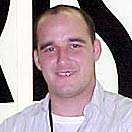

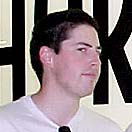
|

|

I don't think so. For as long as we live, I think that film will also continue to exist. Because no matter how you think about it, digital technology is no match for film. (Dan)
The reason we have things like museums and art museums is because everyone wants to see the real thing, not a picture or photo of it. So if it all became digitized, it would be nothing but information, and it would become boring. Regardless of the time period, I don't think that watching images on screen caught on film will ever go out of fashion. (Jason)

I think they will become established. Because many people are paying attention to things like the internet, music videos, and commercials, I'd say that short films will become more and more popular. (Jason)
Now, companies and businesses are also noticing short films and investing in them as sponsors-they're increasingly using them in advertising. So I'd say that they're no longer just something to make on the way to becoming a feature film director, but will become more established as a field of business. By the way, our first 7-minute film was sponsored by Ford. (Dan)

Kurosawa, of course. Because I haven't had much opportunity to see Japanese films, I don't know anything about recent stuff. (Dan)
Kitano Takeshi's Hanabi was good. And works by the Japanese director SABU are also great. (Jason)

|
The director, Jason, won an award for an AIDS education campaign commercial he made when he was 15 years old, and is now very active as a director of commercials. He is now a young 23 years old. "What I made when I was 15 was a 30-second commercial. I brought together people of all kinds of racial backgrounds, shot each of their faces one after another, and ran the message, 'AIDS is not a racial problem; it's a human problem.' Because I was in high school, I gathered together people I randomly asked in the cafeteria, and shot it."
Jason met Dan, who produced "In God We Trust" through Jason's younger brother who was a classmate of Dan's friend. Jason and Dan were attending different high schools, when they met about five years ago and began making films together. Since then, they've made commercials and four short films together.
Dan, who is acting as producer this time, was also a naturally inclined filmmaker when he was young, from which time he used his father's video camera to film all sorts of things. Like Jason, Dan had also made and submitted an AIDS education commercial. When asked if they had both been greatly influenced by MTV, Dan replied, "From the time I was about six, I could see video clips from bands like Ozzy Ozbourne and Motley Crue. The tempo of 'In God We Trust' is fast, so you could probably say that we've been influenced by MTV." Jason's reply: "Our generation came just at the time when Spielberg-like big productions and the independent films that surfaced in the nineties ran up against one another, so I think it's a very exciting generation."
Their work this time, "In God We Trust," is for them a step toward feature length films, while at the same time also an independent work of art. Jason: "Short films, of course, are an effective way to measure one's ability level, but I think of the film itself as a work of art. The audience will come to its various opinions about what the film wants to say; we want to show the audience the ways of living that we're thinking about. So I'm really happy when people who've seen it ask, 'What was the meaning of that film?' Film companies also pay attention to films that incur strong messages like this."

 |




|

|

Personally speaking, I think that film and digital media are really quite different, although I don't know much about it in technological terms. I prefer the traditional style of film, and don't think about even partially using digital technologies.

They are being broadcast in many different countries via the internet and television-I think its growing. I want more people to see them, but because they don't enjoy the same conditions as feature films, which can be seen by anyone anywhere, I can't quite say what will happen in the future.

Kurosawa, Kitano Takeshi, Ozu Yasujiro… I really like Japanese directors. I especially fell in love with Kurosawa's To Live-enough to tattoo "To Live" on my arm!

|
Georgie, who from a very young age dreamt of making movies, talked about how he came to take part in filmmaking: "When I was young, making movies was like a dream, and I didn't know whether or not it would come true. However, I did realize that, in order to achieve my dream, I would have to solidify my own bases of knowledge and ability. So after I studied history in college, I worked for Miramax, after which I studied film at USC (The University of Southern California)." But rather than star-filled Hollywood movies, Georgie wanted to make independent films that could show the production side's personality, and he left the three year program at USC after learning its first year of basics. He says that he began making films that used his own style rather than that of mainstream Hollywood movies. "Me & My Old Man" is his second short film; his policy of making films with a message can be seen within this work's simple documentary form. He recently finished shooting two very short films-3 minutes and 5 minutes-and has now begun editing them. Also, at present, he says that he is in the middle of preparations for a 90-minute film. "The next one I shoot will be my first feature length film, and the theme is the same as that of "Me & My Old Man"-the everyday troubles and small events of a family. What I want to depict is a reflection of the feelings of people who are lonely, who need love-a work that can touch people's hearts. Thus, I have no interest in things like overly dramatic camerawork."

 |
 |
 |
Copyright, (C) American Short Shorts Film Festival 2001. All rights reserved.
Feedback to assff2001@hotmail.com |
|
|